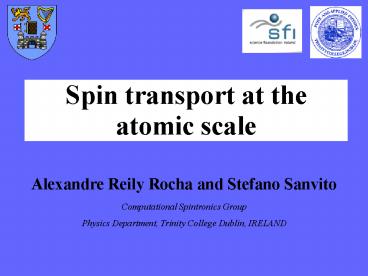Spin transport at the atomic scale - PowerPoint PPT Presentation
Title:
Spin transport at the atomic scale
Description:
Spin transport at the atomic scale. Alexandre Reily Rocha and Stefano Sanvito ... Self-assemble not growth/lithography. Smaller size. New ideas and new functionalities ... – PowerPoint PPT presentation
Number of Views:40
Avg rating:3.0/5.0
Title: Spin transport at the atomic scale
1
Spin transport at the atomic scale
Alexandre Reily Rocha and Stefano Sanvito
Computational Spintronics Group Physics
Department, Trinity College Dublin, IRELAND
2
Why nanoscale spintronics?
3
Magnetoresistance Present vs. Atomic Scale
Technology
GMR Baibich et. al. PRL (1988).
New paradigm
- Self-assemble not growth/lithography
- Smaller size
- New ideas and new functionalities
4
The prototype Spin Valve
I AFtot Iup Idown
5
I FMtot gt I AFtot
B
I FMtot Iup Idown
6
Why going to small objects?
I0
I
I
7
Computational Technique
8
The Model System
VR
VL
f(mL)
f(mR)
Hsn
Left Lead
Right Lead
Scattering Region
mLeFV/2
mReF -V/2
9
Non-equilibrium Greens Function
Scatterers Green function
Density Matrix
Current
10
Non-equilibrium Greens Function in Density
Functional Theory
Prescription for calculating the charge density
L. Sham and W. Kohn, Phys. Rev., 140, A1133
(1965)
SIESTA (Spanish Initiative for Electronic
Simulations with Thousands of Atoms)
- Localized multiple-z Pseudo-atomic orbitals
- Non-Orthogonal basis set
- Super-cells with up to 100 atoms
D. Sánchez-Portal, et. al., Int. J. Quant. Chem.
65, 453 (1997)
11
In principle we solve this
?L
?R
V
But in practice .
?R
?L
V
12
The Leads Selfenergies
Total Hamiltonian
13
Magnetic Materials and localized orbitals
d orbitals fairly localized no coupling between
unit cells
H1 is close to singular
Unitary Transformation A
- Highlights uncoupled states in H1
- States are eliminated and couplings are
renormalized - Numerically Stable
We can solve for very complicated leads and the
size of the system might be drastically
downfolded!!!
14
Results
Nickel Molecular Junctions
15
Benzene dithiol attached to nickel
Two possible magnetic configurations
z
Nickel 100 Surface
16
Transmission ( V 0 Volts)
AF
F
F
Ferromagnetic
Anti-ferromagnetic
17
I-V Characteristics
18
Conclusions
- Material dependent transport properties of
magnetic materials can be probed with a powerful
combination of Non-Equilibrium Greens functions
and Density Functional Theory. - I-Vs present a non-trivial behaviour.
- When d orbitals are present directional bonding
becomes very important. - Different orientations of the leads, position of
S atom
19
Aknowledgements
- Prof. J. Ferrer (Oviedo)
- Mr. Victor M. Garcia Suarez Oviedo)
- Prof. C.J. Lambert (Lancaster)
- Dr. Steve Bailey (Lancaster)
- Science Foundation of Ireland
- Enterprise Ireland
20
(No Transcript)































